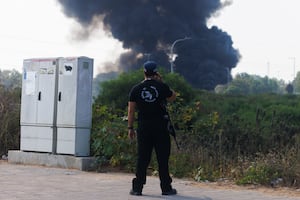The Israeli army on Tuesday claimed it had killed the chief of Iran's armed forces emergency command, who it described as the “most senior military figure in the regime”, four days after he assumed his position.
Maj Gen Ali Shadmani was appointed to the post after Israel killed his predecessor, Maj Gen Gholam Ali Rashid, in its initial wave of attacks on Iran on Friday. Iran has not confirmed Maj Gen Shadmani's death.
The Israeli military said he was killed when its fighter jets attacked central Tehran, based on “precise intelligence”. Army spokesman Brig Gen Effie Defrin said Maj Gen Shadmani was "the most senior military commander of the Iranian regime during the war".
"Shadmani served as the wartime chief of staff of the Iranian regime’s armed forces and was the closest associate of Iran's supreme leader," he said. "Shadmani served in the role for only four days, he too was eliminated.
"We will relentlessly pursue our enemies through advanced intelligence capabilities, exploiting emerging opportunities, air superiority, and complex operational planning."
Israel has killed several top-ranking officers in Iran's military after launching attacks on military and nuclear sites across the country. Maj Gen Hossein Salami, commander of the Islamic Revolutionary Guard Corps (IRGC), and Gen Mohammad Bagheri, chief of staff of the armed forces, were also killed in the first wave of strikes, Iranian media reported.
The IRGC said on Sunday that the head of its intelligence organisation, Mohammed Kazemi, had been killed in an Israeli strike along with two colleagues, Hassan Mohaqeq and Mohsen Bagheri. Scientists have also been killed as Israel takes aim at what it says is a secret nuclear programme, which Tehran insists is peaceful.
Iranian leader Ayatollah Ali Khamenei had praised Maj Gen Shadmani's "merits and valuable experience" as he appointed him to the emergency command role on Friday. He tasked the general with assessing Iran's combat readiness and providing "strategic, operational planning and guidance".
Iran's Fars news agency reported on Tuesday that the country's Cybersecurity Command had banned officials and their protection teams from using equipment connected to public communication and telecommunications networks, in a move likely to be aimed at concealing their locations.
Israel's Mossad spy agency says its operatives inside Iran took part in the initial attacks, and released footage that it said showed agents deploying “precision attack systems designed to destroy Iranian air defence systems”.
A few days later, Iran said it had hanged a man it accused of spying for Israeli intelligence. The Iranian judiciary's Mizan news website said Esmaeil Fekri was arrested in 2023 for espionage.
He was accused of passing to Mossad “classified information, including sensitive locations and headquarters, information about specific individuals, organisational missions etc”, the report said.



